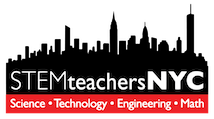Are you new to teaching or new to modeling and want more support for your teaching practice? Looking to nurture or tweak your Elementary STEM lessons or approach? Want to extend key practices learned from workshops? Come to a working group where we can share best practices and receive feedback in an open, collaborative environment. STEMteachersNYC working groups are spaces for sharing successes, addressing challenges, honing or trouble-shooting lessons or strategies, and be a testing ground for innovation. This fall STEMteachersNYC is excited to launch several pedagogy-, grade-, and subject-specific working groups! Join us this fall for one or more:
- — New Teacher Collab! December 8, 2019
- — Elementary STEM, October 20
- — Teacher Efficiency Hacks, October 20
- — AP Physics, TBD
- — HS Biology, TBD
- — EcoSTEM! November 16, 2019!
- — Grading and Assessments working group Spring 2020!
Come prepared to contribute! Possible topics for sessions:
- — Strategies for getting the most out of whiteboarding and how to build class consensus.
- — Assessment ideas geared for the student-centered classroom, grounded in student discourse and group work
- — Brainstorm ways to improve issues of concern to you.
- — Integrating relevant primary research into your lessons.
Each working group meeting will be open to a maximum of 15 participants, and meet at least three times a year, in person and/or virtually, with a rotating team of co-facilitators. Participants can be expected to bring work – a lesson to change, a lesson to finalize, student work, rubric, other assessment or tool, etc. – related to that sessions focus topic. After the first meeting of each group, there will be opportunities for teachers interested in becoming workshop leaders to get their feet wet through co-facilitation.
Some galvanizing ideas about Professional Learning Communities…
“To organize for the improvement of science instruction teachers need opportunities to collaboratively learn from practice, in practice, and to engage in the revision of classroom tools.” (Thompson 2019)
This approach to individual and collective growth in practice is not new, but has been a growing over decades. From the work of Shirley Hord (1997, SEDL Texas) PLCs have been described as incorporating and leveraging “Supportive and Shared Leadership, Collective Creativity, Shared Values and Vision, Supportive Conditions, and Shared Personal Practice.”
From DuFour, DuFour, Eaker, Many, 2010, another detailed elaboration: “Collaborative teams in PLC schools use the four critical questions of learning to drive their collective inquiry and action research:
- — What do we want students to learn? (essential standards)
- — How will we know if they have learned? (team-developed common assessments)
- — What will we do if they don’t learn? (systematic interventions)
- — What will we do if they already know it? (extended learning)”
At STEMteachersNYC we are constantly emphasizing the importance of our approach – teachers teaching teachers. Why? What is “teacher-led professional development”? What are the essential strategies we incorporate? STEMteachersNYC workshop leaders share specific, relevant lessons and student work examples from personal practice… assessments they’ve used… and are not afraid to devote time and openness to discuss and address classroom implementation! Deep dive, research embedded, authentic teacher contextualization, in a PLC package!
Join us in launching our new series of PLC working groups this fall!

